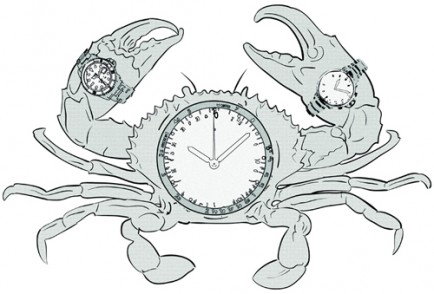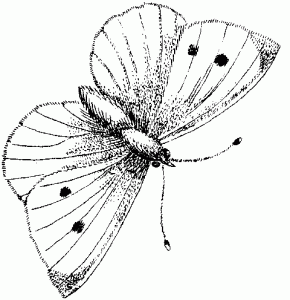Crab’s World
by Angel
 After so many wet and gloomy days, the sun finally showed up. Dampness and depression in the air were swept away by the dazzling sunshine which lightened up everywhere. Tree branches swayed gently in the spring breeze, and the sunshine danced merrily on the glossy green leaves, inviting me to go out and join them. It would be very nice to take a walk along the river flowing in front of my house.
After so many wet and gloomy days, the sun finally showed up. Dampness and depression in the air were swept away by the dazzling sunshine which lightened up everywhere. Tree branches swayed gently in the spring breeze, and the sunshine danced merrily on the glossy green leaves, inviting me to go out and join them. It would be very nice to take a walk along the river flowing in front of my house.
The river was high from of days of raining, and the water appeared cleaner. Grass and wild flowers looked livelier. It was refreshing. I sat down on a rock by the river bank, looking absent-mindedly at the glistening surface of the river. The sunshine’s reflection was glaring, but I squinted without taking my eyes away.
A few moments later, a crab floated onto the river surface, swam to the river bank, and walked towards me. He was a really big crab with two strong pincers. He was no different from other crabs that I’d seen before except he wore three watches, one on each pincer and a third one dangling in front of his chest.
“Lovely weather, isn’t it?” the crab said. I was surprised that he could speak my language and greeted me in such an English fashion. “Yes, very lovely. It’s very nice to be out here.” I answered, and couldn’t help looking at his three watches. They were big golden ones with diamond set dials.
“They must be very expensive and made in Switzerland.” I thought to myself, unaware of his taking notice of my stare until he spoke again. “It’s a fashion in our world. Anyone who can afford wear three watches nowadays.”
I was a little embarrassed about my rudeness, but I asked: “Your world? Is it not the same as mine? What is it?”
“It’s the Crab’s world. A harmonious society.” he replied. “Harmonious society? That’s so great !” I said, “but is it truly harmonious? It’s almost impossible to achieve harmony in a society, you know.”
“Well, there’s no such thing as genuine harmony. It’s only a beautiful vision. But there are some measures that can be taken to create apparent harmony. Just like ugly people have plastic surgeries to become pretty, while their children never fail to reveal their genes.” he explained.
“What specific measures do you take then?” I inquired curiously.
“Do you really want to know about that?” he asked, “it may take some time.”
“I’ve got time.” I said.
He shifted his long legs, found himself a comfortable position, spat out a few bubbles, and started to talk: “The simplest way to create harmonious society is to eliminate all the unharmonious factors. If they cannot be eliminated, the alternative is to harmonize them.”
“What do you actually mean by elimination?” I interrupted, unwilling to misunderstand him.
“Kill, expel or imprison anyone who is our opponent. Eliminating enemies is more convenient than winning them over. Weeds can never become roses, so the only way is to root up the weeds in the rose garden.” he talked light-heartedly as though talking about the weather.
“However, the majority of our people are not stubborn dissidents. Propaganda is enough to appease them for most of the time. They are taught to be content with where they are. For example, in the Crabs’ World, the upper-class wear luxurious timepieces made in Switzerland, the middle-class wear good-quality watches produced in Japan, while the low-class can only buy cheap gadgets from China. The poor are told that they should not aspire to lead the life of the rich, so they resign themselves to the inequality and live with it.”
“Don’t they complain at all?” I interrupted again.
“Of course they grumble sometimes,” he said, “but there are always ways to make then realize that they are better off as they are.”
“Here’s a story. Several months ago, my cousin took a fancy to a rock cleft which had been occupied by a mussel. He asked the mussel to move to another place, but she wouldn’t. She had a shell. What did she want the cleft for? My cousin asked her to decide between the cleft and her own shell. And you know what? That stupid mussel chose to leave her shell to show her determination! She died quickly of course. My cousin got the cleft after all. What did she get? She lost the cleft, her shell and her own life. It could have been much better for her to stay in her shell. Her body has decayed or been eaten up by some fish. Nobody would remember her. And no one would be as foolish to follow her suit.”
The coldness of his words made me shiver a little, which he didn’t fail to notice, though it did not perturb him. “Don’t feel sad, young lady,” he tried to comfort me, “this kind of things happen everywhere. You just haven’t seen enough of the world. I should go now. Nice talking to you.”
He turned around and waved goodbye with his right hand. The sun glared off of his watch and into my eyes, blinding me momentarily. When my eyes cleared he was gone, back into the harmonious society from which he came.



